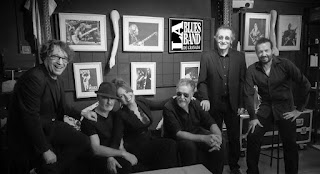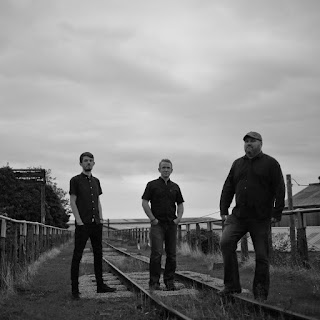GRANADA BLUES BAND
Hometown Granada
- Antonio Valero (Drums)
- Pepe Castro (Bass)
- Estanis Peinado (Piano)
- Pecos Beck (Vocals and Harmonica)
- Agustín Sánchez (Saxo)
- Gregorio Buendía (Trumpet)
Label
1990 - The Best Blues in the City 1992 - Black in the Land of Whites - 1995 Life is Not Easy - 2000 Cuatro - 2002 Knocking on Your Door - 2006 20 years are nothing to us - 2009 The Grand Session
Biography
First period: 1986-1993
The group was initially made up, in 1986, of the singer of Franco-German origin Pecos Beck, the guitarist Joaquín Sánchez, Pepe Chamorro on electric bass and Antonio Valero on drums. After various performances and establishing themselves in the local circuit, Pepe Visedo (sax and flute), Ignacio Sánchez (guitar) and Estanis Peinado (piano and organ) joined. With this formation, and already in 1989, they recorded their first demo, which had a certain impact in specialized media and, especially, on Radio 3. As a result, the Malaga record company Cambayá Records released their first album, titled "El mejor blues of the city" (1990), which was followed by various concerts at Jazz Festivals and its presentation in Madrid.
After some substitutions (Jose Luis Pizarro and Carlos Sánchez took over the guitars, and the North American David Lenker replaced Peinado on the keyboards) the band published what would be, to this day, their most recognized album, "Negro en tierra de blanco" ", for the Big Bang label, received with true praise by critics, "for its naturalness, its apparent lack of effort in mastering the language, for its lack of pretensions and for the high level achieved, which make it one of the best blues albums recorded in Spain".2
The album included classics from the band, such as Drinking and walking, Black in whiteland or Some of my best friends are on Welfare, with lyrics of clear social content.
Second period: 1994-1998
The loss of Beck, Lenker, Martín and Chamorro, in 1994, totally modified the image of the band. The Swiss Connie Resch takes charge of the voice, Joaquín Caballero of the bass, and Javier Avilés of the other lead guitar and keyboards. After a tour, which included Espárrago Rock, Visedo also left the band before entering the recording studio again.
It is with the remaining line-up that they recorded what would be their third album, "Life is not easy" (Big Bang, 1995), which was released in 1996. This album would move away from the purism of the first period and experiment in other sounds and tempos. Despite the fact that its level was artistically and technically inferior to the previous installment, it obtained critical recognition, being selected as the best national blues album of the year.
In 1998, Resch and Caballero left the band due to disagreements with the rest; The voice is assumed by the jazz singer Celia Mur and the position of bassist falls to Pepe Castro, returning again to the group Estanis Peinado.
Third period: 1999-2009
With this formation (J. L. Pizarro, Javier Avilés, Estanislao Peinado, Pepe Castro, Antonio Valero and Celia Mur), and with the return of Pecos Beck, the group reactivates its presence on the national circuits and in the media, after publishing its album "Cuatro" (Ambar, 2000), undoubtedly the band's most popular (according to references to public acceptance, sales and awards it received, such as Best Jazz and Blues album, at the Music Awards of Andalusia in the year 2000). The new sound, while moving away from R&B roots, gains experience and recovers images associated with historic Jazz Rock bands, such as Blood, Sweat & Tears, while bringing a new and more pop line from its composers. These new ideas, the forceful rhythmic base, the skill of its guitarists, the presence of its vocalists and the strengthening of the sound provided by a powerful wind section, made up of Nardy Castellini (saxes), Eric Sánchez and Gregorio Buendía (trumpets) and Rafa Martínez (trombone), made this one of the most powerful groups on the Spanish music scene.
A practically unchanged formation, they will record their next album, "Llamando a tu puerta" (Ambar, 2002), where the band develops their personal versions of R&B and Soul classics.
A transition disc.
The following years, the group performs various tours and special works, such as didactic concerts for schoolchildren, in collaboration with the City of Granada Orchestra. Among the tours, the one they did in 2005 together with the singer, Rosa López (something that their most purist fans do not forgive them), with 17 concerts and a surprise among critics, stood out due to the influx of public and media projection. A year later, in 2006, the band celebrated its 20th anniversary on the scene, with a concert in which the British guitarist Otis Grand performed as a special guest, with whom a relationship began (and a long series of concerts).
In 2007, the band intervenes in the soundtrack of the film by Alex Quiroga, "Buscando a Enma", composed by Estanis Peinado. A year later, in 2008, they published a compilation box with three CDs and one DVD, under the title "20 years are nothing" (El Perro Andaluz, 2008), collecting all their recordings, as a celebration of those two decades of life, an almost unusual fact, given the transience with which the groups appear and disappear without leaving a trace.5 Finally, the relationship with the English guitarist bears fruit in the recording of an album by the band with Otis Grand, who produces the musical and adds his guitar. The album is published in 2009 (The Grand Sessions, Riff-Duradisc), after carrying out the sessions and mixing in London.6
Discography
• The best blues in the city (Cambayá, 1991)
• Black in white land (Big Bang, 1992)
• Life is not easy (Big Bang, 1995)
• Four (Amber, 2000)
• Knocking at your door (Ambar, 2002)
• 20 years are nothing (Perro Andaluz-Duradisc, 2008)
• The Grand Sessions, with Otis Grand (Riff Productions-Duradisc, 2009)
The Blues Band of Granada is a legendary group that celebrated its 30th anniversary in 2016 practicing the best blues against all odds. Antonio Valero and Pepe Castro, the engine room of the rhythm section on drums and bass, respectively; Estanis Peinado on piano and José Luis Pizarro on electric guitar; Agustín Sánchez, Gregorio Buendía and Rafa Martínez, like the ardent wind section of saxophone, trumpet and trombone, perfectly oiled, and crowning the peerless Pecos Beck with his resounding voice and hurricane blowing from the harmonica.
After some sections in which there were comings and goings, entrances and exits of members that in some way hindered the evolution of the band, at this moment there are many years in which the same formation is established and in a position to offer the best version of the Blues Band, since when they start to rock and roll, few can overshadow them, during the last three decades and with a repertoire without competition, the result of so many years of activity.
The Blues Band of Granada are largely responsible for the fact that the twelve-bar genre has remained alive, active and in force in Granada and throughout Andalusia for the last thirty years. The virtuosity of its components as instrumentalists and of the group itself as a perfectly oiled machine for distilling top-class blues, their knowledge of the various styles, the mastery of the patterns that define them, and all this together with the successful selection of repertoire that has historically presented by the Granada Blues Band, make it an essential group to explain and understand the music made in the city of the Alhambra.
The Blues Band emerged in 1986 when the Franco-German singer Pecos Beck joined the trio made up of Joaquín Sánchez on guitar, Pepe Chamorro on bass and Antonio Valero on drums to offer their first performances. Shortly after, the guitarist Ignacio Sánchez, Pepe Visedo on flute and sax and Estanis Peinado on piano and keyboard joined. With that formation they recorded their first album in 1990, “El Mejor Blues de la Ciudad” for the Antequera label Cambayá Records.
For the next one, “Negro en Tierra de Blancos” (Big Bang, 1992), David Lenker replaced Peinado on the keys and the guitars passed into the hands of José Luis Pizarro and Carlos Martín. On this album, received with unanimous praise from critics, we already find some of his indisputable classics.
In 1994 the first crisis occurred and in one fell swoop Beck, Martín, Lenker, Chamorro and later Visedo left the band, being replaced by the Swiss Connie Resch as lead singer, Joaquín Caballero on bass and Javier Avilés on guitar and keyboards. This formation records its third album, "La Vida No Es Fácil" (Big Bang, 1996), more open stylistically but perhaps less brilliant, and after the departures of Resch and Caballero, the group restructures itself again with the incorporation of Celia Mur on vocals and Pepe Castro on bass, and the return of Pecos Beck and Estanis Peinado.
This is how they will face their next albums, the highly celebrated “Cuatro” (Ambar, 2000), considered their best album, and the next “Llamando a Tu Puerta” (Ambar, 2002). With both, the group broadens its stylistic palette and incorporates elements of soul into the rhythm&blues of its beginnings, and a forceful jazz-rock sound that ties them to seventies bands like Blood, Sweat & Tears, with the addition of a powerful metal section. The group then goes through its sweetest moment and is consolidated with the line-up that has survived to this day.
His experiments with the OCG would come later, the most criticized accompanying Rosa López, and finally the edition of the box set “20 Años No Son Nada” (El Perro Andaluz, 2008) with all his recordings up to that year. They still had a great moment to live accompanying Otis Grand, the result of whose collaboration they would publish their latest reference, the album "The Grand Sessions" (Riff Producciones, 2009).
Currently the Blues Band of Granada is made up of Beck, Pizarro, Peinado, Castro and Valero, completed with Agustín Sánchez on sax, Gregorio Buendía on trumpet and Rafa Martínez on trombone, and with the addition of the choirs of Ester Erenas and Mari Carmen cherry.
Current formation:
- Pecos Beck (Vocals and Harmonica)
-J.L. Pizarro (Guitar)
- Estanis Peinado (Piano)
- Pepe Castro (Bass)
- Antonio Valero (Drums)
- Agustin Sanchez (sax)
- Gregorio Buendía (Trumpet)
- Rafa Martinez (Trombone)



Σχόλια
Δημοσίευση σχολίου